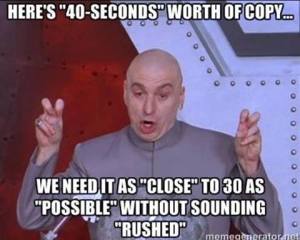There are a few tricks any tips to getting the most out of your radio advertising campaign:-
1. Be on in plenty of time
It’s amazing how many people talk to the radio station a day or two before their event. You should give writers and producers time to create your advertising. The less time, the less thought will go into your advertising and that’s not a good thing. Three or four days to get the copy sorted, than after approval a couple of days for production. (These days it CAN be quicker, but leave time for possible issues… like your company name pronounced wrong)
2. Be on FOR plenty of time
Radio works with reach and repetition. You need your message going to the most number of people for a good number of times. Ignore the magic number of 3.25 times a listener needs to hear your message, it may need to be more times if your offer isn’t compelling. Whatever the magic number for YOUR ad, you need to be on for a while before people will start responding.
3. Give your campaign time to work.
Stick with it. If you get no response from the first few ads, give it time. Factors that will influence this are things like buying cycles, and how good your offer is!
4. Don’t throw away your creative approach
Maintain a sound for your company. Maybe keep the same music or voice. The sound effect (sonic brand trigger) at the end. Your copywriter should be able to do variations on a theme.
5. Be consistent
You don’t have to be on the radio all the time, but you need to make it sound like you are. When you do big promotions or events with the station you already have a relationship with the listener. Some big companies dip in to radio from time to time and the listener, because they have that personal connection with the station, can be left wondering, “what are you doing here?”
6. Be compelling
If your offer, deal or promotion doesn’t excite anyone outside your company, why would it excite or motivate the listener into action. You will only get a response to your radio advertising IF you give a good enough reason to respond. “Buy our tyres because we sell them” is not a compelling message.
7 Don’t say you’re friendly… sound friendly
“We’re a friendly family company” Mmmm. Mike Bersin uses the illustration of a guy who goes into a bar, walks up to a lady and says “I’m friendly”. How long do you think she’s hang around? Don’t say you’re friendly.. make sure your ads are warm, friendly and inviting…. if that’s the image you want.
8. Reflect in your other media.
I know you probably want to “test” radio. Well test how well it works when you do the mix… and watch how well your press starts to do when you reflect the campaign on radio and TV if you can afford that.
9 Tell your staff
“I’ve come about the buy one get one free offer on tyres?!”
Blank look
“The one on Radio Rushton FM?”
Blanker look (can a look be blanker than blank?)
“Tyres? 2 for 1?”
“I’ll have to call Mike… but he’s on holiday.
Please, let your sales staff… ALL your staff know what you’re running and the deal.You’d be surprised how many don’t! And train them to upsell!!
10. Say when it worked!
Feedback to the Radio Station sales team and writers when a campaign has worked. Put it in writing. Trust me, a client who gives this kind of feedback I love working for… and go the extra mile for. Then if it doesn’t work for them in the future they have my undivided attention.





